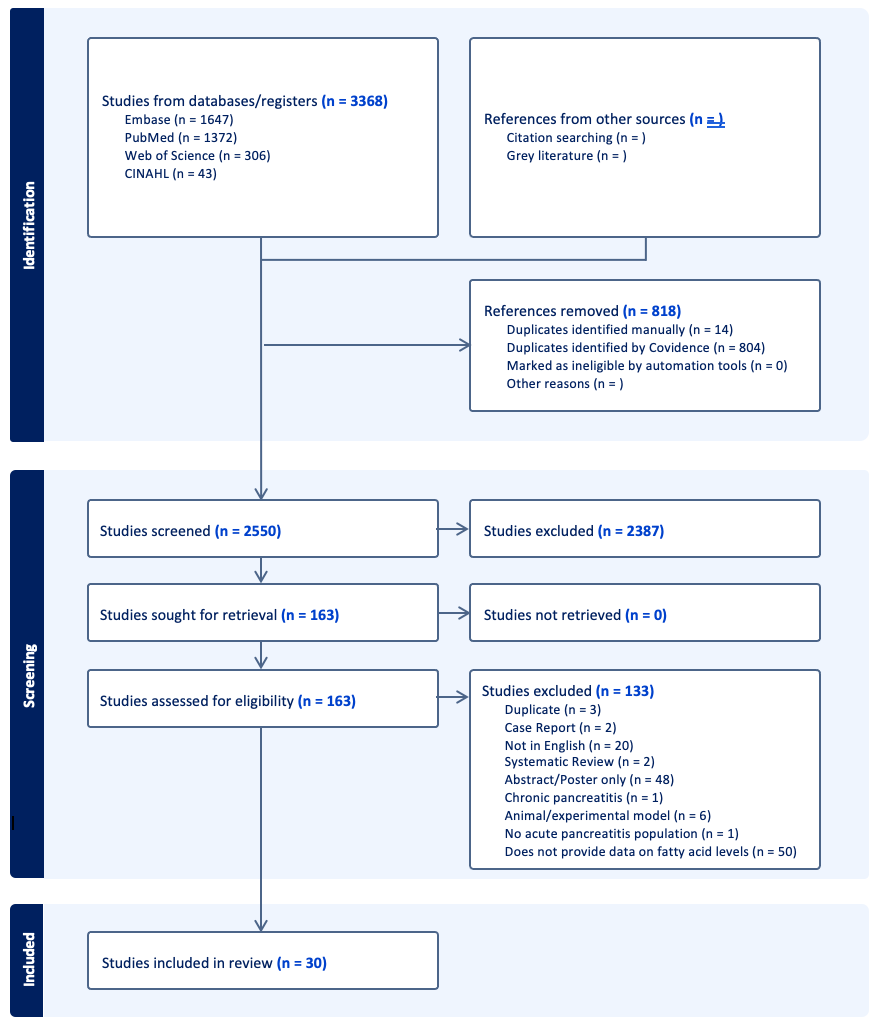Tuesday Poster Session
Category: Biliary/Pancreas
P4323 - The Role of Serum Free Fatty Acids in Predicting Acute Pancreatitis Severity: A Systematic Review
Tuesday, October 28, 2025
10:30 AM - 4:00 PM PDT
Location: Exhibit Hall
- JS
Jordan Stellern, MD
Keck School of Medicine of the University of Southern California
Arcadia, CA
Presenting Author(s)
Jordan Stellern, MD1, Scott Jun, MD2, Charlotte Botz, BS2, Andrew Tarakji, BS3, Ara Sahakian, MD2, James Buxbaum, MD2
1Keck School of Medicine of the University of Southern California, Arcadia, CA; 2Keck School of Medicine of the University of Southern California, Los Angeles, CA; 3Western University of Health Sciences, College of Osteopathic Medicine, Los Angeles, CA
Introduction: Free fatty acids (FFAs) have been implicated in the pathogenesis of acute pancreatitis (AP) through their pro-inflammatory and cytotoxic effects. In contrast, short-chain fatty acids (SCFAs) promote intestinal barrier integrity, and the administration of omega-3 FA have been shown to be beneficial for decreasing mortality and complications in AP. This systematic review attempts to evaluate the relationship between specific classifications of serum FFA levels and the severity of AP, aiming to clarify their potential role as biomarkers for disease progression and clinical outcomes.
Methods: A systematic review following the Preferred Reporting Items for Systematic Reviews and Meta Analyses (PRISMA) 2020 guidelines was conducted and registered on PROSPERO in January 2025. A comprehensive, multi-database search with cross referencing and snowballing was completed to identify relevant studies. Studies that correlated serum levels of fatty acids or their derivatives, with outcome of acute pancreatitis patients were included.
Results: A systematic review but not quantitative meta-analysis was performed given heterogeneity of fatty acid levels studied and experimental design.
We identified 5 interventional trials (N=208 patients) and 25 observational (N=1,891 patients) that met criteria. Patients with acute pancreatitis had significantly higher levels of total free fatty acids.
Elevated free fatty acids, particularly unsaturated fatty acids like palmitoleic acid, correlate with severe disease, necrosis, and organ failure while higher levels of long-chain polyunsaturated fatty acids including eicosapentenoic acid appeared protective in most studies. Supplementation with omega-3 polyunsaturated fatty acids (EPA, DHA) leads to higher serum concentrations of these molecules, and is linked to lower clinical severity scores and fewer complications. Increased levels of fatty acid binding protein were also significantly associated with disease severity and worse clinical outcomes.
Discussion: These findings highlight the potential utility of serum fatty acid markers for early risk stratification and as therapeutic targets in future clinical management. Prediction of disease severity is one of the most important clinical goals in the management of patients with acute pancreatitis and remains a significant clinical challenge. Therefore, it is crucial that future studies continue to instigate this topic to further our understanding of FFA in the progression of severe disease.

Figure: Figure 1. PRISMA Flowchart

Figure: Figure 2. QR code to Study Characteristics and Key Findings Table
Disclosures:
Jordan Stellern indicated no relevant financial relationships.
Scott Jun indicated no relevant financial relationships.
Charlotte Botz indicated no relevant financial relationships.
Andrew Tarakji indicated no relevant financial relationships.
Ara Sahakian: Boston scientific – Consultant. Olympus medical – Consultant.
James Buxbaum: Boston Scientific – Consultant. Olympus – Consultant.
Jordan Stellern, MD1, Scott Jun, MD2, Charlotte Botz, BS2, Andrew Tarakji, BS3, Ara Sahakian, MD2, James Buxbaum, MD2. P4323 - The Role of Serum Free Fatty Acids in Predicting Acute Pancreatitis Severity: A Systematic Review, ACG 2025 Annual Scientific Meeting Abstracts. Phoenix, AZ: American College of Gastroenterology.
1Keck School of Medicine of the University of Southern California, Arcadia, CA; 2Keck School of Medicine of the University of Southern California, Los Angeles, CA; 3Western University of Health Sciences, College of Osteopathic Medicine, Los Angeles, CA
Introduction: Free fatty acids (FFAs) have been implicated in the pathogenesis of acute pancreatitis (AP) through their pro-inflammatory and cytotoxic effects. In contrast, short-chain fatty acids (SCFAs) promote intestinal barrier integrity, and the administration of omega-3 FA have been shown to be beneficial for decreasing mortality and complications in AP. This systematic review attempts to evaluate the relationship between specific classifications of serum FFA levels and the severity of AP, aiming to clarify their potential role as biomarkers for disease progression and clinical outcomes.
Methods: A systematic review following the Preferred Reporting Items for Systematic Reviews and Meta Analyses (PRISMA) 2020 guidelines was conducted and registered on PROSPERO in January 2025. A comprehensive, multi-database search with cross referencing and snowballing was completed to identify relevant studies. Studies that correlated serum levels of fatty acids or their derivatives, with outcome of acute pancreatitis patients were included.
Results: A systematic review but not quantitative meta-analysis was performed given heterogeneity of fatty acid levels studied and experimental design.
We identified 5 interventional trials (N=208 patients) and 25 observational (N=1,891 patients) that met criteria. Patients with acute pancreatitis had significantly higher levels of total free fatty acids.
Elevated free fatty acids, particularly unsaturated fatty acids like palmitoleic acid, correlate with severe disease, necrosis, and organ failure while higher levels of long-chain polyunsaturated fatty acids including eicosapentenoic acid appeared protective in most studies. Supplementation with omega-3 polyunsaturated fatty acids (EPA, DHA) leads to higher serum concentrations of these molecules, and is linked to lower clinical severity scores and fewer complications. Increased levels of fatty acid binding protein were also significantly associated with disease severity and worse clinical outcomes.
Discussion: These findings highlight the potential utility of serum fatty acid markers for early risk stratification and as therapeutic targets in future clinical management. Prediction of disease severity is one of the most important clinical goals in the management of patients with acute pancreatitis and remains a significant clinical challenge. Therefore, it is crucial that future studies continue to instigate this topic to further our understanding of FFA in the progression of severe disease.

Figure: Figure 1. PRISMA Flowchart

Figure: Figure 2. QR code to Study Characteristics and Key Findings Table
Disclosures:
Jordan Stellern indicated no relevant financial relationships.
Scott Jun indicated no relevant financial relationships.
Charlotte Botz indicated no relevant financial relationships.
Andrew Tarakji indicated no relevant financial relationships.
Ara Sahakian: Boston scientific – Consultant. Olympus medical – Consultant.
James Buxbaum: Boston Scientific – Consultant. Olympus – Consultant.
Jordan Stellern, MD1, Scott Jun, MD2, Charlotte Botz, BS2, Andrew Tarakji, BS3, Ara Sahakian, MD2, James Buxbaum, MD2. P4323 - The Role of Serum Free Fatty Acids in Predicting Acute Pancreatitis Severity: A Systematic Review, ACG 2025 Annual Scientific Meeting Abstracts. Phoenix, AZ: American College of Gastroenterology.
